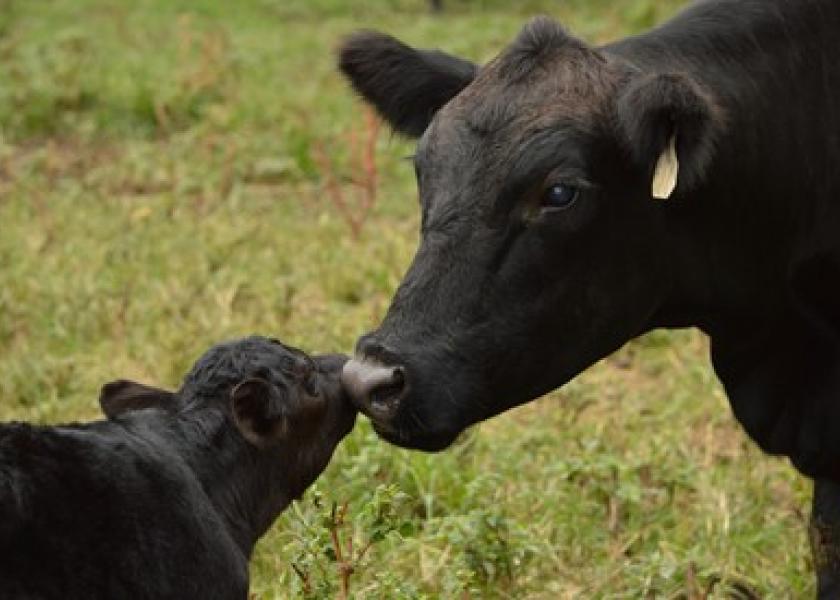Simple Math Sets Calves Up for Success

No cattleman wants to be locked-in to a management regimen. After all, no two cow herds are the same; no two environments are the same.
Sticking to a strict modified-live vaccination program that fits the cattle working schedule is often challenging for both producers and veterinarians. While research has shown that modified-live vaccinations can be very effective in preventing abortions, a one-size-fits-all protocol might not be the best route for effective protection. That’s why developing a fetal protection program in cooperation with your herd veterinarian is key to setting calves up for success right from the start.
As cattlemen prepare for the fall breeding season and work to develop recently weaned spring-born calves, it’s never too early to think about protecting the next calf crop by implementing a strong fetal protection vaccine program.
“It’s important to get that calf going good, and the right health all starts from the beginning,” said Cody Jorgensen, a partner in Jorgensen Land and Cattle near Ideal, South Dakota. “If you aren’t off to a good start, it’s a battle the rest of the way through that calf’s life.”
“What we’re doing by using fetal protection vaccines is that we are effectively protecting the calf prior to birth. If you couple that with a proper nutritional program, we’re setting that calf up for success in being able to reach its full genetic potential, from the time it’s conceived all the way through the production cycle,” says Mark Alley, DVM, Technical Services veterinarian with Zoetis.
While research has shown that a modified-live vaccination program can be highly effective in helping prevent abortions caused by infectious bovine rhinotracheitis (IBR) and persistent infection caused by bovine viral diarrhea (BVD) viruses Types 1 and 2, maintaining a strictly modified-live vaccination program that fits the cattle working schedule can be challenging for veterinarians and producers alike.
A nearly three-year study at Auburn University evaluated the efficacy of a vaccination program where heifers were all vaccinated with two doses of a modified-live reproductive vaccine (BOVI-SHIELD GOLD FP® 5) prior to breeding.1 At pregnancy check, the vaccinated heifers were split into two groups — one continued to get BOVI-SHIELD GOLD FP 5 and a second group was given CATTLEMASTER GOLD FP® 5. The study also maintained a control group, which received no vaccinations.
Study results in the control group revealed the severity of the challenge model with 14 of 15 cows either aborting BVD-positive calves or delivering a BVD persistently infected calf. Researchers observed significant (p < 0.0001) protection against both virulent BVD and IBR exposure in the vaccinated groups with both vaccine groups providing similarly high levels of protection.1
Dr. Alley says it is important for producers and veterinarians to look at the labels to make sure they are selecting vaccines that are effective in protecting against the reproductive forms of these important diseases. This means looking for the following information on the vaccine label:
- “FP” in the name of the product, which is a designation that the vaccine provides fetal protection
- Indication to prevent or control IBR-related abortions
- Indication to prevent or control BVD persistently infected calves
Producers are encouraged to visit with their veterinarian or local Zoetis representative about developing an effective fetal protection program or visit FetalCalfProtection.com for more information.
Do not use in pregnant cows (abortions can result) unless they were vaccinated, according to label directions, with any BOVI-SHIELD GOLD FP or PREGGUARD GOLD FP® vaccine prebreeding initially and within 12 months thereafter. Do not use in calves nursing pregnant cows unless their dams were vaccinated within the past 12 months as described above. To help ensure safety in pregnant cattle, heifers must receive at least 2 doses of any BOVI-SHIELD GOLD FP or PREGGUARD GOLD FP vaccine with the second dose administered approximately 30 days prebreeding.
Reference:
1 Walz PH, Givens MD, Rodning SP, et al. Evaluation of reproductive protection against bovine viral diarrhea virus and bovine herpesvirus-1 afforded by annual revaccination with modified-live viral or combination modified-live/killed viral vaccines after primary vaccination with modified-live viral vaccine. Vaccine. 2017;35(7):1046-1054.







